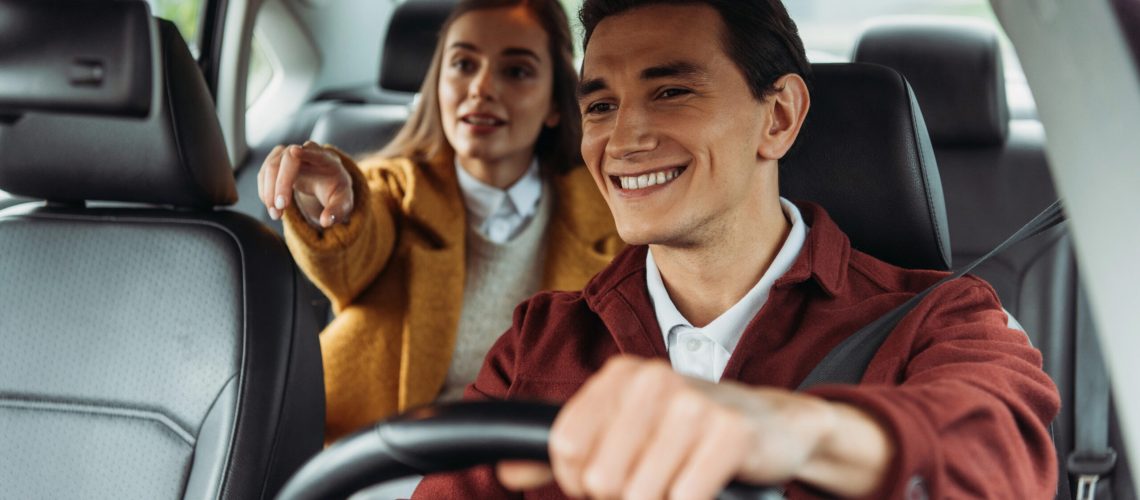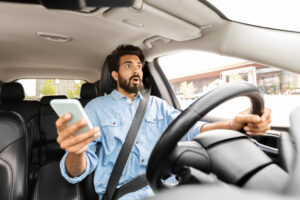When your rideshare trip takes an unexpected turn, understanding your legal rights as a passenger can make all the difference in your recovery journey. Rideshare services like Uber and Lyft have transformed how we get around California, but when accidents happen, many passengers are left wondering: “What are my rights, and how do I protect them?” This comprehensive guide will walk you through everything California residents need to know about rideshare accidents, insurance coverage, and how to secure the compensation you deserve.
Understanding Rideshare Accident Liability in California
When involved in a rideshare accident in California, determining liability is often the first challenge on the path to compensation. Unlike traditional taxi services, rideshare operations function under a unique legal framework that can complicate liability issues.
The Complicated Insurance Picture
Rideshare accidents involve multiple potential insurance policies, depending on the driver’s status at the time of the accident:
Period 1: App On, No Passenger Match When the driver has the app on but hasn’t been matched with a passenger, coverage is limited. During this period, rideshare companies typically provide:
- $50,000 per person for bodily injury
- $100,000 per accident for bodily injury
- $25,000 per accident for property damage
Period 2: En Route to Pick Up a Passenger Once the driver accepts a ride and is en route to pick up the passenger, coverage increases significantly:
- $1 million in third-party liability coverage
Period 3: During the Ride with Passenger While you’re in the vehicle as a passenger, the highest level of coverage applies:
- $1 million in third-party liability coverage
- Uninsured/underinsured motorist coverage
- Contingent collision and comprehensive coverage (if the driver has such coverage on their personal policy)
Understanding these periods is crucial because they determine which insurance policies apply to your accident. As a passenger, you’ll almost always be covered under the $1 million policy (Period 3), but complications can arise when multiple parties share fault or when injuries exceed policy limits.
Multiple Parties, Multiple Claims
Rideshare accidents often involve multiple potential liable parties:
- The rideshare driver
- The rideshare company (Uber or Lyft)
- Other drivers involved in the accident
- Vehicle manufacturers (in cases of defective parts)
- Government entities (if poor road conditions contributed)
This web of potentially responsible parties means passengers may need to file multiple claims to recover full compensation. This complexity underscores why having experienced legal representation is so important following a rideshare accident.
Passenger Rights Under California Law
California has implemented some of the nation’s strongest protections for rideshare passengers. Understanding these rights is essential to ensuring you receive fair treatment after an accident.
The Duty of Care Owed to Passengers
Under California law, rideshare companies and their drivers owe passengers a duty of care. This legal obligation means they must take reasonable steps to ensure passenger safety, including:
- Properly maintaining vehicles
- Following traffic laws and safety regulations
- Driving responsibly and avoiding distractions
- Providing a safe pick-up and drop-off experience
When drivers or companies breach this duty of care and an accident results, passengers have the right to hold them accountable for resulting injuries and losses.
California’s Mandatory Insurance Requirements
California law mandates that rideshare companies carry commercial insurance to protect passengers. This requirement ensures that even if a driver’s personal insurance denies a claim (which is common, as most personal policies exclude commercial activities), passengers still have access to compensation through the company’s policy.
The Transportation Network Companies (TNC) regulations in California specifically require rideshare companies to maintain substantial insurance coverage for passengers. These regulations were designed with passenger protection in mind, recognizing the unique risks associated with the rideshare model.
Rights to Compensation
As a rideshare passenger injured in an accident, you may be entitled to compensation for:
- Medical expenses (both current and future)
- Lost wages and diminished earning capacity
- Pain and suffering
- Emotional distress
- Rehabilitation costs
- Property damage
California follows a “pure comparative negligence” system, meaning injured parties can recover damages even if they were partially at fault. However, as a passenger, you typically won’t bear any responsibility for the accident, making your claim relatively straightforward compared to claims between drivers.
Steps to Take After a Rideshare Accident
The actions you take immediately following a rideshare accident can significantly impact your ability to recover fair compensation. Following these steps will help protect both your physical well-being and your legal rights:
- Prioritize Safety and Medical Attention
Your first priority should always be safety. Check yourself and others for injuries and call 911 immediately if anyone is hurt. Even if you feel fine, seek medical attention as soon as possible. Many serious injuries, particularly those affecting the head, neck, and spine, may not show symptoms immediately but could worsen over time.
Getting prompt medical care serves two crucial purposes:
- It ensures any injuries are properly diagnosed and treated
- It creates official medical records linking your injuries to the accident
- Document Everything
Thorough documentation is invaluable for your claim. If you’re physically able, gather the following:
- Photos of the accident scene, all vehicles involved, and your injuries
- Names and contact information of all parties involved (including your driver and other drivers)
- Insurance information from all drivers
- License plate numbers and vehicle descriptions
- Contact information for any witnesses
- The accident location, date, and time
- Weather and road conditions
- Screenshot of your rideshare receipt/trip information
The rideshare app on your phone contains valuable evidence about your trip, including your driver’s information, the route, and the exact time of the accident. Take screenshots of this information before it disappears.
- Report the Accident
Report the accident through the appropriate channels:
- Call the police and ensure an official accident report is filed
- Report the accident through the rideshare app
- Notify your own auto insurance company (if you have one)
While reporting the accident to the rideshare company is important, be cautious about giving recorded statements or accepting quick settlement offers without first consulting an attorney. These companies often try to resolve claims quickly and for minimal amounts.
- Consult with an Experienced Personal Injury Attorney
Before communicating with insurance adjusters or accepting any settlement offers, consult with a personal injury attorney experienced in rideshare accidents. At VIP Injury Attorneys, we understand the complexities of these cases and can help you:
- Determine all available insurance coverages
- Calculate the full extent of your damages, including future expenses
- Handle all communications with insurance companies
- Gather additional evidence to strengthen your claim
- Fight for maximum compensation
Remember, insurance companies work to protect their bottom line, not your best interests. Having an advocate in your corner ensures you don’t settle for less than you deserve.
Common Challenges in Rideshare Accident Claims
Rideshare accident claims present unique challenges that don’t typically arise in standard auto accident cases. Being aware of these potential obstacles can help you better navigate the claims process.
Insurance Coverage Disputes
One of the most common challenges is determining which insurance policy applies. Rideshare companies may argue that the driver wasn’t “on the clock” at the time of the accident, attempting to avoid liability. Similarly, the driver’s personal insurance might deny coverage based on commercial activity exclusions.
These disputes can leave injured passengers caught in the middle, facing delays in receiving compensation. Having an attorney who understands the nuances of rideshare insurance policies is crucial to overcoming these challenges.
Determining Liability Among Multiple Parties
When multiple vehicles are involved in a rideshare accident, establishing who was at fault can become complicated. Each party typically points fingers at the others, making it difficult for passengers to know who to hold accountable.
A thorough investigation is often necessary to determine:
- Whether the rideshare driver was negligent
- If other drivers contributed to the accident
- Whether the rideshare company’s policies or practices played a role
- If vehicle defects or road conditions were factors
Collecting Sufficient Evidence
Building a strong claim requires substantial evidence, which can be challenging to collect after a rideshare accident. Passengers may be visitors unfamiliar with the area, making it harder to document the scene. Additionally, rideshare companies may be reluctant to share data about the driver’s history or the trip itself.
Professional legal representation can help overcome these evidence-gathering challenges through:
- Formal discovery processes
- Subpoenas for relevant company records
- Expert accident reconstruction
- Obtaining electronic data from vehicles
- Identifying and interviewing witnesses
The Rising Concern of Uninsured Drivers
While rideshare passengers generally have access to the company’s insurance policy, a growing concern is the increase in uninsured or underinsured drivers on California roads. This is particularly relevant when another driver causes the accident involving your rideshare vehicle.
Recent changes to California’s minimum auto insurance requirements have raised concerns about a potential increase in uninsured drivers. As of January 1, 2025, California doubled its minimum liability requirements from 15/30/5 to 30/60/15, potentially making insurance unaffordable for some drivers and leading them to drive without coverage.
The Impact on Rideshare Passengers
If an uninsured driver hits your rideshare vehicle, you may need to rely on the rideshare company’s uninsured/underinsured motorist coverage. However, these claims can be complicated, with insurance companies often trying to minimize payouts.
In these situations, having uninsured motorist coverage on your own auto policy provides an additional layer of protection. If you’re regularly using rideshare services, it’s worth reviewing your personal insurance to ensure you have adequate coverage.
How VIP Injury Attorneys Can Help
Navigating the aftermath of a rideshare accident can be overwhelming, especially when you’re dealing with injuries. At VIP Injury Attorneys, we provide VIP treatment every step of the way, fighting relentlessly for the compensation you deserve.
Our Approach to Rideshare Accident Cases
When you choose VIP Injury Attorneys, you get a team that:
- Investigates thoroughly: We collect and analyze all available evidence, including rideshare app data, surveillance footage, witness statements, and expert testimony.
- Identifies all liable parties: We leave no stone unturned when determining who should be held accountable for your injuries.
- Calculates full damages: We work with medical and financial experts to assess the total impact of your injuries, including future medical needs and lost earnings.
- Negotiates aggressively: We leverage our experience and reputation to secure the best possible settlement from insurance companies.
- Prepares for trial: While most cases settle out of court, we prepare every case as if it will go to trial, giving us a stronger negotiating position.
The VIP Difference
What sets us apart is our commitment to Victory, Integrity, and Passion:
- Victory: We work tirelessly to secure the compensation you deserve, and we bet our fees on it—no win, no fee!
- Integrity: We provide honest guidance and dedicated representation without the gimmicks.
- Passion: We genuinely care about your recovery and fight passionately for your rights.
When to Seek Legal Help After a Rideshare Accident
While not every accident requires legal representation, rideshare accidents almost always benefit from professional legal guidance. You should consider contacting a personal injury attorney if:
- You’ve suffered significant injuries requiring medical treatment
- You’ve missed work or might have long-term disability
- The rideshare company or insurer is disputing liability
- You’re being pressured to accept a quick settlement
- Multiple parties are involved in the accident
- The insurance company is delaying or denying your claim
The sooner you consult with an attorney, the better. Early legal intervention allows for prompt evidence gathering and protection of your rights from the start.
The Bottom Line: Protecting Yourself After a Rideshare Accident
While rideshare services provide convenient transportation options, accidents can happen. Being prepared and knowing your rights can make all the difference in your recovery journey.
Remember these key points:
- Seek immediate medical attention, even for seemingly minor injuries
- Document everything about the accident and your injuries
- Report the accident to appropriate authorities and the rideshare company
- Consult with an experienced personal injury attorney before speaking with insurance companies
- Don’t accept a quick settlement without understanding the full extent of your damages
Need Help Following a Rideshare Accident?
When injury strikes, life can turn upside down. Medical bills pile up, work becomes impossible, and the future feels uncertain. Don’t face this alone. VIP Injury Attorneys stand in your corner, every step of the way.
Let us help you fight for the treatment you need and the compensation you deserve. We offer a “No Win, No Fee” guarantee! So don’t settle for less than VIP treatment. Contact us today for a free consultation and let us take the fight off your shoulders. We’ll handle the legal battles while you focus on healing and rebuilding your life.
Stay updated on important legal and insurance changes by subscribing to our newsletter or following us on Facebook, YouTube, Instagram, and TikTok.





